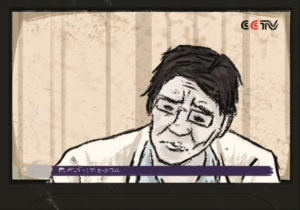Book release: Trial by Media
On November 23, 2018, Safeguard Defenders will release its next book, Trial By Media - China's new show trials, and the global expansion of Chinese media, edited by Peter Dahlin. The release of this book follows the release of an earlier book, the acclaimed The People’s Republic of the Disappeared, edited by Michael Caster, which exposed the realities behind China’s use of secret prisons through RSDL, and the organization’s groundbreaking research report, Scripted and Staged, into China’s use of forced televised confessions. If Scripted and Staged provided a peek into the reality behind the use of forced TV confessions, Trial By Media goes further, and with brand new testimonies from victims, some speaking out at considerable risk, the active role of Chinese state media is exposed, and their extensive collaboration with police not merely in broadcasting, but in extracting, recording and producing these confessions. CCTV and other state media’s complicity in gross human rights violations – the denial of the right to a fair trial, is explored.
A press conference will be held in London on November 23, to reveal additional steps being taken against CCTV for its continued broadcasting internationally of “forced TV confessions”. Attendance is by invite and RSVP only. Want to know more? Email us.
The book begins, and ends, by looking at the true nature of CCTV, and how it’s different from how we normally think of a state TV broadcaster. In these chapters, the book delves deep into the role that CCTV, and other state/party media, plays both in the use of forced TV confessions, but also as part of Xi Jinping’s “going out” policy.

The book looks at how China is working to expand its influencing operations internationally, and how the rapid expansion of state/party media, of which CCTV is the flagship, is but one of several trends working in tandem. State media’s expansion is put next to how independent Chinese language media, in countries from Australia to the United States and across Europe, is and has been silenced over the past five years, and how both these developments stand side-by-side under the guise of the United Front Work Department. These developments, alongside the 16+1 initiative in Central- and Eastern Europe, the Belt and Road Initiative, and investment into or purchasing of key media, especially in Africa, are all part of the same strategy, one that seeks to sow division in- and between western countries, and to overturn the current global institutional framework, and replace it with one developed and led by China.
Book released on Amazon worldwide November 23, with both paperback and Kindle editions available.
The emotional center of the book consists of eight testimonials - fully developed short stories -which centers on the use of forced TV confessions, but each which expands into and shows several new trends in China since the rise of Xi Jinping.

As many of the victims are either core targets of the 709 crackdown, or in other ways related to them, the testimonials also offer insight into the Chinese state’s thinking about the rights defense movement, an insight we can gain by reading about the back and forth exchanges between victims and their captors. The testimony of Zhai Yanmin shows the troubled state of China’s criminal judicial process, where, after several forced TV confessions – the same process starts over, but this time, he is forced to sit down with judge, police, and prosecutor. Once there, together they practice his court appearance, his demeanor, everything – except this time, for his show trial, there could be no retakes.
 The star in Professor Liu Sixin’s testimony, like in several others, is CCTV’s Dong Qian, shown to play a very active role in both his and others’ forced TV confessions. Lawyer Wang Yu, whose experience with RSDL has been told before in The People’s Republic of the Disappeared, here reveals how her son was used as a pawn against her, how he was made to attack others, and the torture police used against him to make him cooperate, all of it with a clear purpose, forcing Wang Yu to cooperate and “confess” on TV. Activist Liu Xing, like several others, remembers how he would be drugged, and how he spent a year after his systematic forced drugging to recover from it. Wen Qing, like Zhai, speaks on how his very identity came under attack because of the TV confessions, and the long road back. Peter Dahlin writes about experiencing going through a lie detector test, all the while his girlfriend was kept incommunicado, in solitary confinement, whilst State Security prodded him to record a “confession” video. With Peter Humphrey, a British former journalist, we learn how he, and his American wife Yu Yingzeng, ended up being paraded on TV as collateral damage into a major corruption scandal that had nothing to do with them, but an international pharmaceutical conglomerate. The book also offers solutions for what regulatory bodies in target countries can do when it comes to CCTV’s existing or planned presence, and that their presence, and therefore their need to adapt to local rules, can be a silver lining, offering a chance to affect positive change in the behavior of Chinese media, and to their culpability in committing gross human rights violations.
The star in Professor Liu Sixin’s testimony, like in several others, is CCTV’s Dong Qian, shown to play a very active role in both his and others’ forced TV confessions. Lawyer Wang Yu, whose experience with RSDL has been told before in The People’s Republic of the Disappeared, here reveals how her son was used as a pawn against her, how he was made to attack others, and the torture police used against him to make him cooperate, all of it with a clear purpose, forcing Wang Yu to cooperate and “confess” on TV. Activist Liu Xing, like several others, remembers how he would be drugged, and how he spent a year after his systematic forced drugging to recover from it. Wen Qing, like Zhai, speaks on how his very identity came under attack because of the TV confessions, and the long road back. Peter Dahlin writes about experiencing going through a lie detector test, all the while his girlfriend was kept incommunicado, in solitary confinement, whilst State Security prodded him to record a “confession” video. With Peter Humphrey, a British former journalist, we learn how he, and his American wife Yu Yingzeng, ended up being paraded on TV as collateral damage into a major corruption scandal that had nothing to do with them, but an international pharmaceutical conglomerate. The book also offers solutions for what regulatory bodies in target countries can do when it comes to CCTV’s existing or planned presence, and that their presence, and therefore their need to adapt to local rules, can be a silver lining, offering a chance to affect positive change in the behavior of Chinese media, and to their culpability in committing gross human rights violations.